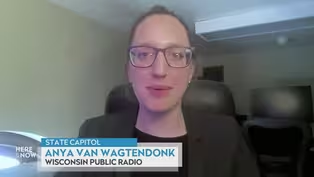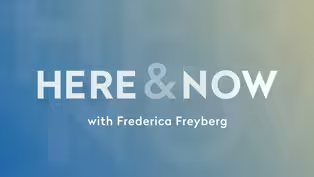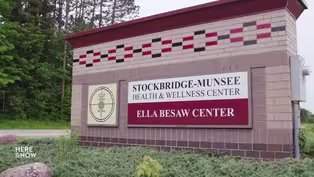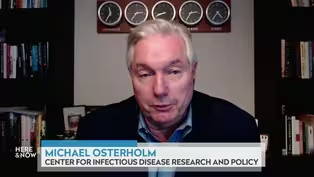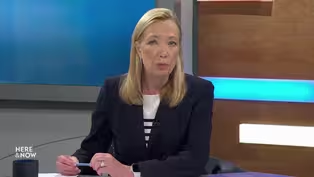Here and Now
Wisconsin Tribal Elder Food Box Program Faces Unsure Future
Clip: Season 2300 Episode 2350 | 7m 11sVideo has Closed Captions
Elimination of federal funding is putting strains on a Tribal Elder Food Box program.
A Tribal Elder Food Box program launched in Wisconsin during the COVID-19 pandemic has expanded statewide, but elimination of federal funding is putting serious strains on producers and its operation.
Problems playing video? | Closed Captioning Feedback
Problems playing video? | Closed Captioning Feedback
Here and Now is a local public television program presented by PBS Wisconsin
Here and Now
Wisconsin Tribal Elder Food Box Program Faces Unsure Future
Clip: Season 2300 Episode 2350 | 7m 11sVideo has Closed Captions
A Tribal Elder Food Box program launched in Wisconsin during the COVID-19 pandemic has expanded statewide, but elimination of federal funding is putting serious strains on producers and its operation.
Problems playing video? | Closed Captioning Feedback
How to Watch Here and Now
Here and Now is available to stream on pbs.org and the free PBS App, available on iPhone, Apple TV, Android TV, Android smartphones, Amazon Fire TV, Amazon Fire Tablet, Roku, Samsung Smart TV, and Vizio.
Providing Support for PBS.org
Learn Moreabout PBS online sponsorshipcommunities across the state.
Fred.
>> Thank you.
Erica.
In related news, it began as an emergency response to the pandemic.
But the tribal Elder Food Box program has grown into a vital source of nourishment and cultural pride for Wisconsin's Native American elders.
Now, with federal funds running out, the program's future and the health of those who depend on it faces new uncertainty.
Here and now.
Reporter Aditi Debnath has the story.
>> Whenever you eat an indigenous foods that were culturally appropriate to who you are, it actually speaks to your DNA.
It actually speaks to who you are as an individual.
>> The tribal Elder Food Box program, launched during the Covid 19 pandemic to address food insecurity among Native American elders in Wisconsin's tribes.
>> Our very first distribution here, I don't even know if it was 2021, but we distributed 400 boxes and I think an hour and a half.
And so from there, the program just keeps growing and growing.
>> The program provides elders healthy, culturally relevant food from producers that use sustainable practices.
indigenous producers.
Now we're up to like 40 or 50 indigenous producers.
>> Today, dozens of indigenous farmers, food makers and processors supply food for the boxes, creating new markets for native farmers.
Initially serving just three tribal communities, the program quickly expanded to reach every indigenous tribe in Wisconsin.
>> We're going all the way from the top of Wisconsin, Bayfield, all the way down to Milwaukee and down to Madison to Ho-Chunk.
>> Tara Roberts Turner is the manager of the Wisconsin Food Hub Cooperative, a statewide organization that helps local farmers sell and distribute their product.
>> It's definitely more difficult.
>> This year.
The loss of federal funding for the U.S. Department of Agriculture's Local Food Purchase Assistance, or LRF ARPA, sent shockwaves throughout the country, disrupting vast networks of producers, distributors and recipients.
The Food Hub, which provided distribution for many food bank programs under ARPA, found its infrastructure caving in.
>> We had a lot of Bakke calls from the tribal elder runs, so we would go all the way up to Bayfield, and then we would pick product up all the way back.
Now we're left bringing an empty truck all the way back.
>> The funding cuts have forced logistical changes, increased costs and left trucks empty on return trips, straining the entire operation.
The challenges extend beyond food delivery, impacting local economies and farmers, including indigenous farmers.
>> It's been a great partnership to really grow together over the past couple of years.
>> Isaiah Skenandore his beef farm in Seymour, Wisconsin.
He joined the program to supply beef and chicken directly to tribal elders.
with that program was you product would go to the end user, and so I was able to have all of our beef and chickens that was purchased through that program.
Under contract, get sent to the elder Box program.
>> Skenandore, a member of the Oneida Nation, uses regenerative farming techniques like rotational grazing, which mimics natural grazing practices and promotes healthier soils and livestock.
He says the program's focus on fresh, sustainable food is a major shift from the past, when federally funded food boxes known as tribal commodities, were often filled with processed items like canned meats and powdered milk, which were high in preservatives.
For many native families, these foods were a lifeline, but they also contributed to health problems that still affect native communities today.
>> When I was a kid with my grandma, I remember going and picking up the tribal commodities, which is right down the road here, and you'd get the government commodities, which would be the flour and processed And it's led to a lot of the epidemics we have, you know, throughout Indian country.
And to come full circle now and be able to provide high quality protein and sustainable food source to our elders, we take a lot of it really, you know, makes makes you pretty proud.
>> Indigenous people are one and a half times more likely to develop diabetes, and up to three times more likely to experience heart failure.
For elders like Kathy Hughes, the food boxes make a difference.
>> And I find when I don't have stuff like that in my refrigerator, then I'm doing the fast food.
I'm doing a lot of sandwiches and, you know, cold cuts, that kind of stuff.
Not really healthy for you.
Versus the boxes I'm cooking and I'm getting healthy stuff when I cook.
>> Beyond physical health.
The program helps foster connection.
Between indigenous people and their culture.
Marlon Skenandore is an Oneida councilman who brought the food Box program to his tribe.
>> I ran a food pantry for six years, and in the beginning, a majority of the people that we seen was just single elders, 65 plus, living off Social Security.
They don't have enough to pay their bills.
And so if some of the items that you would get in here are going to be expensive items, the things that they wouldn't be able to afford, or they would just walk by in the grocery store.
So for us to provide this nutritious, good, wholesome food to them, I think is vital for their longevity in life and being a part of this community.
For the past two years, the Tribal Elder Food Box program has received funding from the state's biennial budget for 2026.
Governor Evers has asked the state legislature to approve $2 for the program.
The end of the federal ARPA program leaves a $1.5 million gap in the program's budget come 2026.
>> We've looked at incorporation as a as a nonprofit and starting to look for some of the philanthropic funding out there.
There are many who want to see us succeed and thank God they're there.
>> Gary Besaw, one of the program's founders, says the funding challenges are daunting, but the farmers say they need help.
>> They're coming forward and saying, we were depending on that.
Is there room?
Do you need product?
If you can, that's going to help keep us, keep us going.
This will keep us from from going bankrupt.
>> The fate of the tribal Elder Food Box program will signal not just the state's commitment to its native communities, but also its vision for local food systems, rural economies, and the dignity of its elders.
probably pleased.
we're not smart.
The old people were smart.
We just parrot them.
And people might think, these guys know what they're doing.
That's because we listen.
We listen to the old people.
>> Reporting from Oneida.
Anya van Wagtendonk on Wisconsin's 2025-27 Budget Session
Video has Closed Captions
Clip: S2300 Ep2350 | 5m 19s | Anya van Wagtendonk on budget talks among Republican lawmakers and what's on the table. (5m 19s)
Here & Now opening for June 27, 2025
Video has Closed Captions
Clip: S2300 Ep2350 | 1m | The introduction to the June 27, 2025 episode of Here & Now. (1m)
How Federal Funding Cuts Threaten Tribal Health Services
Video has Closed Captions
Clip: S2300 Ep2350 | 3m 58s | Uncertainty over federal funding could destabilize health care in tribal communities. (3m 58s)
Michael Osterholm on Goals of The Vaccine Integrity Project
Video has Closed Captions
Clip: S2300 Ep2350 | 7m 11s | Michael Osterholm explains shifts by the CDC Advisory Committee on Immunization Practices. (7m 11s)
Senators Baldwin and Johnson React to Airstrikes on Iran
Video has Closed Captions
Clip: S2300 Ep2350 | 1m 10s | Tammy Baldwin and Ron Johnson on U.S. airstrikes on nuclear program sites in Iran. (1m 10s)
Providing Support for PBS.org
Learn Moreabout PBS online sponsorship
- News and Public Affairs

Top journalists deliver compelling original analysis of the hour's headlines.

- News and Public Affairs

FRONTLINE is investigative journalism that questions, explains and changes our world.












Support for PBS provided by:
Here and Now is a local public television program presented by PBS Wisconsin
